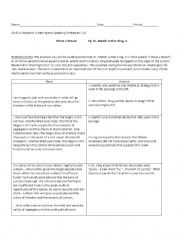
|
MLK�s "I Have a Dream": Rhetorical Strategies
This worksheet gives students practice at identifying and analyzing rhetorical strategies (ethos/pathos/logos/repetition) in MLK�s historical speech "I Have a Dream". Text is on the left, and corresponding questions are on the right. Enjoy!
Level: advanced
Age: 14-17
Type: worksheet
Downloads: 28
|
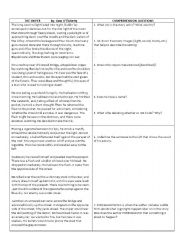
|
"The Sniper" Text & Questions
I use this worksheet to teach Liam O�Flaherty�s short story "The Sniper" to my English 10 students. We listen to the story and stop after each section to answer the questions and discuss our responses. The ending is surprising, and it has been a student favorite for years. Enjoy!
Level: intermediate
Age: 12-17
Type: worksheet
Downloads: 17
|
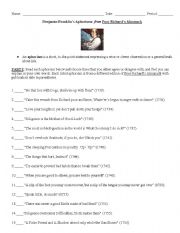
|
Benjamin Franklin�s Aphorisms
This is a great worksheet that gives middle and high school students a chance to practice paraphrasing and analyzing three of Benjamin Franklin�s famous Aphorisms from Poor Richard�s Almanack. I model paraphrasing the first Aphorism on the overhead, and then let students loose to choose three others that "speak to them." This activity took up a who...
Level: intermediate
Age: 12-17
Type: worksheet
Downloads: 12
|
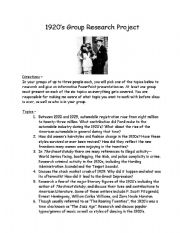
|
The Roaring 1920�s: Group Research Project
Prior to reading The Great Gatsby, I assign my English 11 students this group project so they can familiarize themselves with the images and concepts unique to the Jazz Age (1920�s). The assignment requires students to use six sources to create an informational PowerPoint on a topic such as: men and women�s hair and fashion, the stock market crash,...
Level: advanced
Age: 14-17
Type: worksheet
Downloads: 13
|
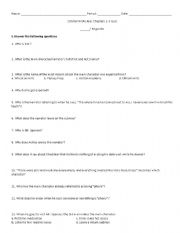
|
Catcher in the Rye: Ch. 1-3 Quiz
A 33 point quiz that asks questions about basic plot, characters, and key vocabulary terms featured in chapters 1-3 of Catcher in the Rye. Enjoy!
Level: advanced
Age: 14-17
Type: worksheet
Downloads: 14
|
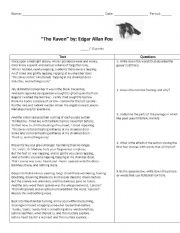
|
The Raven: Text & Questions
After listening to Edgar Allan Poe�s famous poem "The Raven" I display this worksheet on the whiteboard and also give students a copy. Because of the difficult language, we answer the questions together as a class. This worksheet gives students an opportunity to practice identifying internal rhyme, tone, mood, and descriptive imagery. I usually fol...
Level: intermediate
Age: 13-17
Type: worksheet
Downloads: 42
|
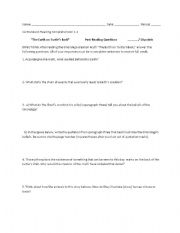
|
The Earth on Turtle�s Back: Mythology Questions
After listening to the Native American myth "The Earth on Turtle�s Back," I ask my English 11 students to individually answer these post-reading questions. Then, we discuss their responses as a class. This is one of two myths I teach as a part of my unit on early American Lit. Enjoy!
Level: intermediate
Age: 12-17
Type: worksheet
Downloads: 1
|
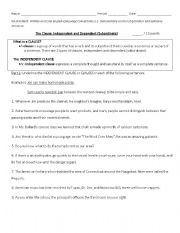
|
Independent & Dependent Clauses Worksheet
I use this worksheet/packet to teach independent vs. dependent (subordinate) clauses. I guide instruction through each section as follows: I model the first 1-2 problems, we do the next few together as a class, students do the next few in pairs, and the final few individually as a "ticket out the door." I make sure to have a copy of the worksheet o...
Level: intermediate
Age: 12-17
Type: worksheet
Downloads: 20
|
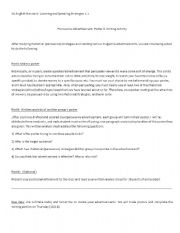
|
Essay Reflection Questions
After handing back students� graded essays, I give them these six questions to answer. The point is for them to reflect on their writing process and the grade they received. It also works well to have a group discussion about their responses, afterward. Enjoy!
Level: intermediate
Age: 12-17
Type: worksheet
Downloads: 5
|
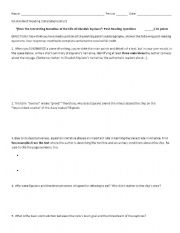
|
Olaudah Equiano Slave Narrative: Post-Reading Questions
After my English 11 students read excerpts of Olaudah Equiano�s famous slave narrative I assign them these post-reading questions. Enjoy!
Level: advanced
Age: 14-17
Type: worksheet
Downloads: 2
|